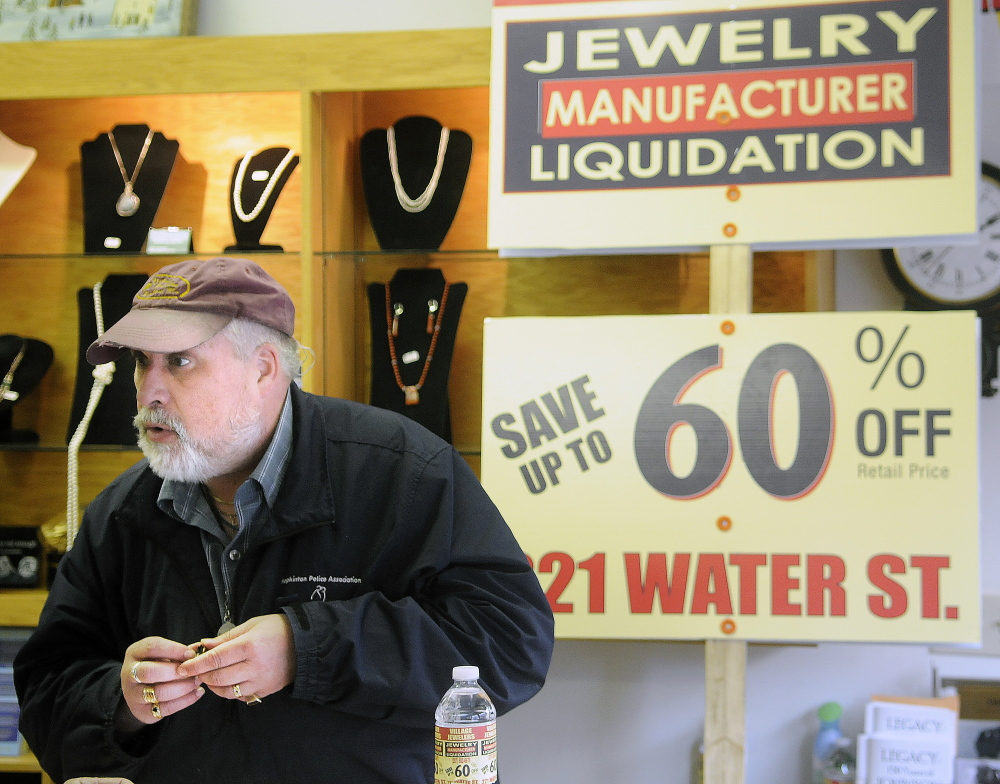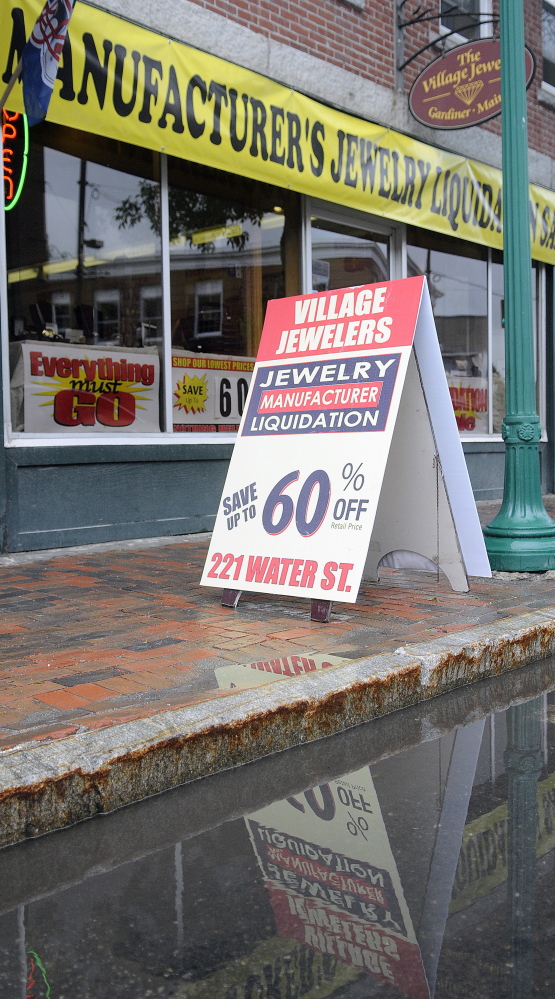It’s not an unusual sight: People holding signs at intersections advertising store-closing sales, or, come October, wearing Halloween costumes while holding signs for seasonal costume shops.
But in Maine, the signs they’re holding are illegal.
It’s part of a state law controlling outdoor advertising and roadside signs for attractions, including the ban on billboards.
The owner of a downtown Gardiner jewelry store found that out in late April when the state told him to stop using sign walkers to advertise a liquidation sale or face fines. He had hired a South Carolina-based company to run a sale to get rid of old merchandise and boost sales after a slow winter, but he said the plan has backfired now that he’s been unable to drive enough shoppers to his store.
“I tried something and the state failed me,” said Daniel Lane, owner of The Village Jeweler. “I’d say it’s 100 percent my fault because I tried to have a business here.”
Signs advertising businesses or sales generally aren’t allowed if they aren’t on the premises of the businesses or if the signs are in any public way, such as a sidewalk, said Chip Kelley, the Maine Department of Transportation technician who deals with signage issues and who told Lane about the violation.
The department does administer a program that allows businesses to pay for official directional signs within 10 miles of the businesses, typically grouped vertically on sign posts and telling drivers the distances and directions to the businesses. Otherwise, signs fall into the same category as billboards, which have been banned in Maine since 1977.
“Off-premise signs are illegal regardless who’s holding them or how they’re constructed,” Kelley said.
Maine is one of few states, along with Alaska, Hawaii and Vermont, to ban billboards, although it appears some other places have rules against sign walkers.
In Arizona, the city of Scottsdale is suing the state to allow the city to keep its ban on people carrying or wearing advertising on public streets. The Arizona Legislature passed a law in 2014 prohibiting cities from restricting sign walkers on public sidewalks, and the Arizona Court of Appeals is expected to rule soon on the issue, according to the Arizona Republic.
Maine’s transportation department has never fined anyone for violating the law, and instead enforces it through education, said Ted Talbot, spokesman for the department. The department also has only Kelley in charge of enforcing the rules, so it relies on the public to alert the department about violations, he said.
“Most people just don’t understand the law, and that’s OK,” Talbot said.
CAUGHT OFF GUARD
The jewelry sales consultant brought in to run the sale at The Village Jeweler said he had never heard of sign walkers being illegal. He said the company, Silverman Consultants, did at least one similar sale in Maine before and didn’t encounter any problems. The consultant, Robert Barnes, said sign walkers are the best way to advertise such sales because people look at them more than they do at other types of advertising.
The business had people holding signs at the start of the sale on April 23 at the median near the Gardiner-Randolph bridge and at the intersection of Bridge and Water streets. By the next Monday afternoon, April 27, however, Kelley informed Lane that sign walkers are illegal, Lane said.
Lane declined to say how much he’s paying the company to run the sale, which includes steeply discounted merchandise bought from other liquidation sales, but he said sales were about 75 percent below his expectations.
He said the company operating the sale contacted him to see if he wanted to end the sale early, but the store plans to keep running it through Fathers’ Day on June 21.
The prohibition of sign walkers didn’t just take Lane and his business by surprise. Curtis Picard, executive director of the Retail Association of Maine, said he had never heard of the prohibition until Lane contacted him.
Picard said he’s seen businesses use sign walkers for sales elsewhere in the state, so he didn’t at first know whether they were all illegal when he heard from Lane.
He’s encouraging Lane to write a letter to Gov. LePage about the experience. Picard said the governor has responded to small business owners in the past over “regulations that are considered onerous or lack common sense, and this could be one of those.”
OTHER SIGH VIOLATIONS
Lane also isn’t the only local person to run into problems with the billboard law in recent years.
The city of Gardiner and an organization promoting its downtown, Gardiner Main Street, put a banner over Water Street in 2013 welcoming Pine State Trading Co. to Gardiner soon after the distributor moved the majority of its operation to the city. But the city was told by the transportation department that the banner was considered a billboard advertising the business and had to come down, said Patrick Wright, executive director of the downtown organization.
In Dresden, the owners of a beef cattle farm, Eastern River Cattle Co., installed a sign for the company about three years ago in a 32-acre field on Route 27 used for grazing. Soon afterward, the state told the company that the sign is considered a billboard unless the animals are actually in the field, owner Jeff Biden said.
For most of the year, when the cattle aren’t grazing, the sign is covered by plywood, he said.
Paul Lessard, an owner of Neokraft, a sign manufacturer in Lewiston, said there is so much ignorance about the state’s sign laws that it’s not surprising most people don’t know what signs are considered illegal. There are a lot of details in sign regulations, so it’s easy to break the laws, he said. Even real estate signs posted at the beginning of dead-end streets should be considered illegal by state law, he said.
“When I drive around, I see a lot of illegal signs,” Lessard said. “I could turn somebody in every day, but there isn’t any point to it.”
Lane pointed out that even though he’s not allowed to have people holding signs for his business at intersections in Gardiner, a panhandler is often standing in the same intersections, asking drivers for money.
“At some point,” he said, “I’m going to be out holding a sign saying I’d like food and shelter, but I can’t have my sale sign out there.”
Last year, the city of Portland adopted an ordinance banning panhandlers in street medians, citing safety concerns; but a federal judge struck it down in February as an unconstitutional violation of free-speech rights after the American Civil Liberties Union of Maine challenged the ordinance.
Paul Koenig can be contacted at 621-5663 or at:
pkoenig@centralmaine.com
Twitter: pdkoenig
Send questions/comments to the editors.




Success. Please wait for the page to reload. If the page does not reload within 5 seconds, please refresh the page.
Enter your email and password to access comments.
Hi, to comment on stories you must . This profile is in addition to your subscription and website login.
Already have a commenting profile? .
Invalid username/password.
Please check your email to confirm and complete your registration.
Only subscribers are eligible to post comments. Please subscribe or login first for digital access. Here’s why.
Use the form below to reset your password. When you've submitted your account email, we will send an email with a reset code.